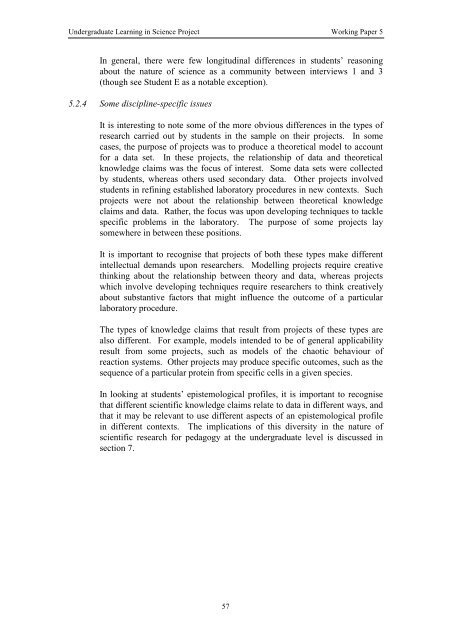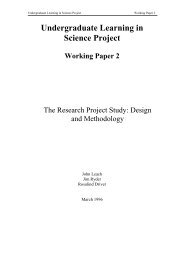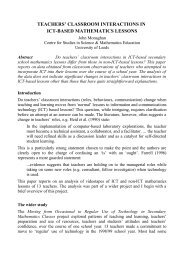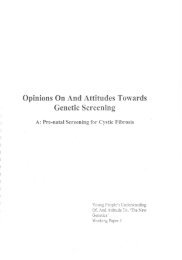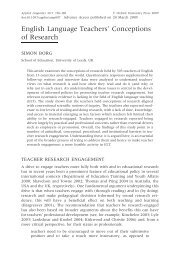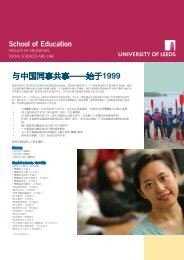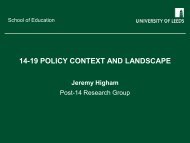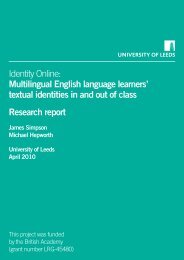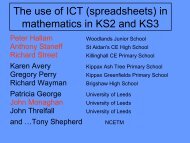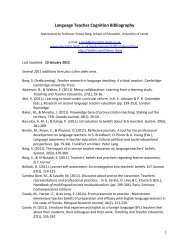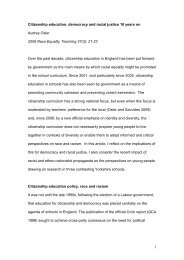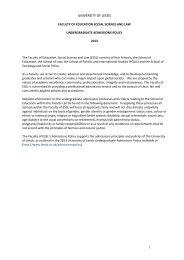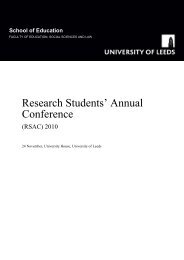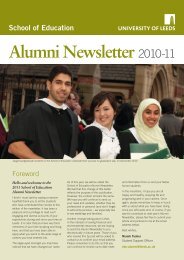Undergraduate science research projects and students - School of ...
Undergraduate science research projects and students - School of ...
Undergraduate science research projects and students - School of ...
You also want an ePaper? Increase the reach of your titles
YUMPU automatically turns print PDFs into web optimized ePapers that Google loves.
<strong>Undergraduate</strong> Learning in Science Project Working Paper 5In general, there were few longitudinal differences in <strong>students</strong>’ reasoningabout the nature <strong>of</strong> <strong>science</strong> as a community between interviews 1 <strong>and</strong> 3(though see Student E as a notable exception).5.2.4 Some discipline-specific issuesIt is interesting to note some <strong>of</strong> the more obvious differences in the types <strong>of</strong><strong>research</strong> carried out by <strong>students</strong> in the sample on their <strong>projects</strong>. In somecases, the purpose <strong>of</strong> <strong>projects</strong> was to produce a theoretical model to accountfor a data set. In these <strong>projects</strong>, the relationship <strong>of</strong> data <strong>and</strong> theoreticalknowledge claims was the focus <strong>of</strong> interest. Some data sets were collectedby <strong>students</strong>, whereas others used secondary data. Other <strong>projects</strong> involved<strong>students</strong> in refining established laboratory procedures in new contexts. Such<strong>projects</strong> were not about the relationship between theoretical knowledgeclaims <strong>and</strong> data. Rather, the focus was upon developing techniques to tacklespecific problems in the laboratory. The purpose <strong>of</strong> some <strong>projects</strong> laysomewhere in between these positions.It is important to recognise that <strong>projects</strong> <strong>of</strong> both these types make differentintellectual dem<strong>and</strong>s upon <strong>research</strong>ers. Modelling <strong>projects</strong> require creativethinking about the relationship between theory <strong>and</strong> data, whereas <strong>projects</strong>which involve developing techniques require <strong>research</strong>ers to think creativelyabout substantive factors that might influence the outcome <strong>of</strong> a particularlaboratory procedure.The types <strong>of</strong> knowledge claims that result from <strong>projects</strong> <strong>of</strong> these types arealso different. For example, models intended to be <strong>of</strong> general applicabilityresult from some <strong>projects</strong>, such as models <strong>of</strong> the chaotic behaviour <strong>of</strong>reaction systems. Other <strong>projects</strong> may produce specific outcomes, such as thesequence <strong>of</strong> a particular protein from specific cells in a given species.In looking at <strong>students</strong>’ epistemological pr<strong>of</strong>iles, it is important to recognisethat different scientific knowledge claims relate to data in different ways, <strong>and</strong>that it may be relevant to use different aspects <strong>of</strong> an epistemological pr<strong>of</strong>ilein different contexts. The implications <strong>of</strong> this diversity in the nature <strong>of</strong>scientific <strong>research</strong> for pedagogy at the undergraduate level is discussed insection 7.57


